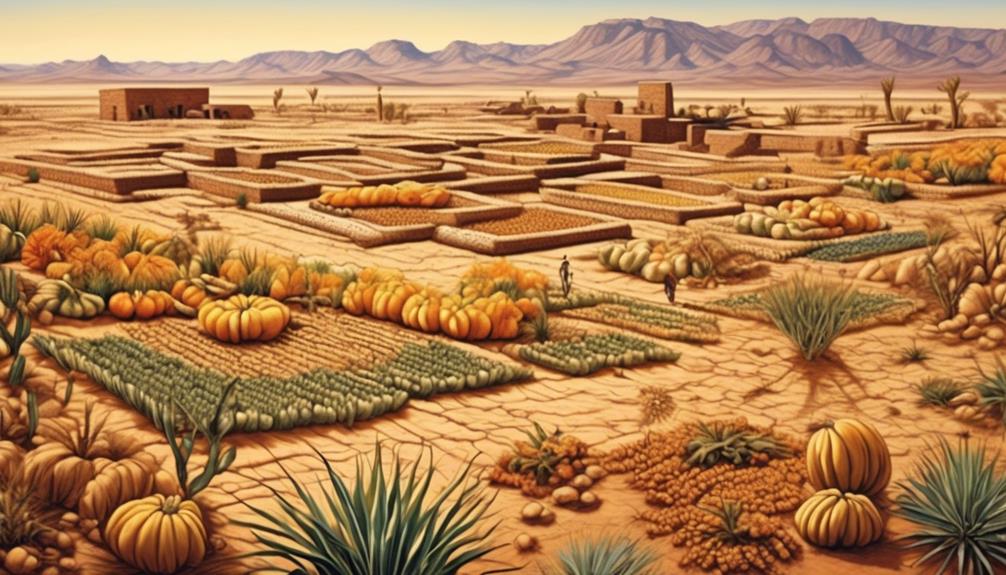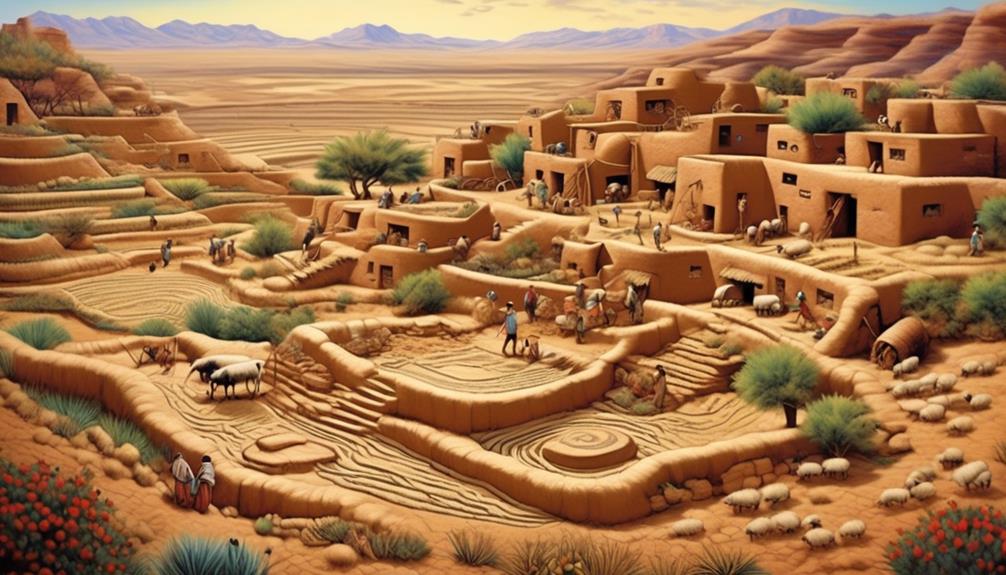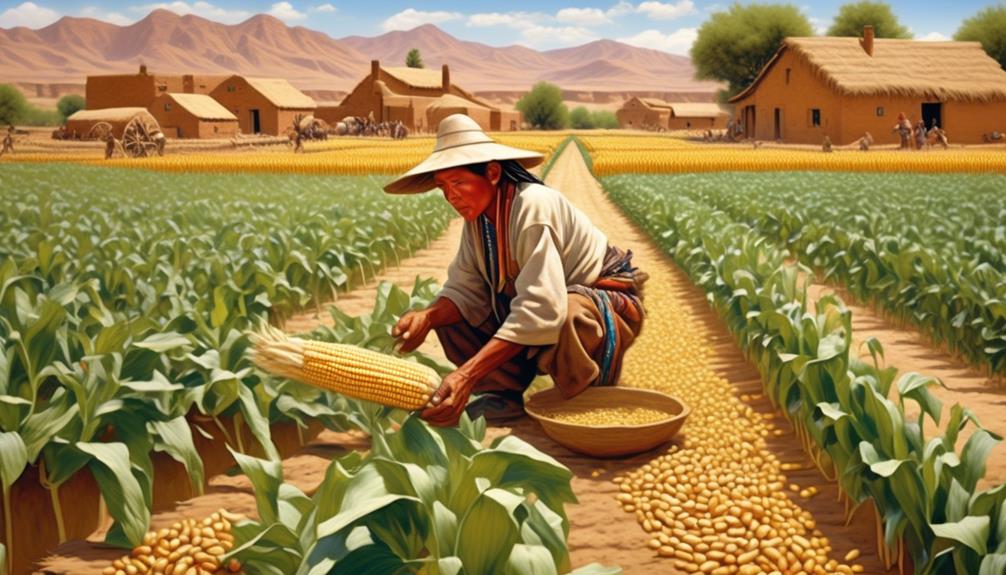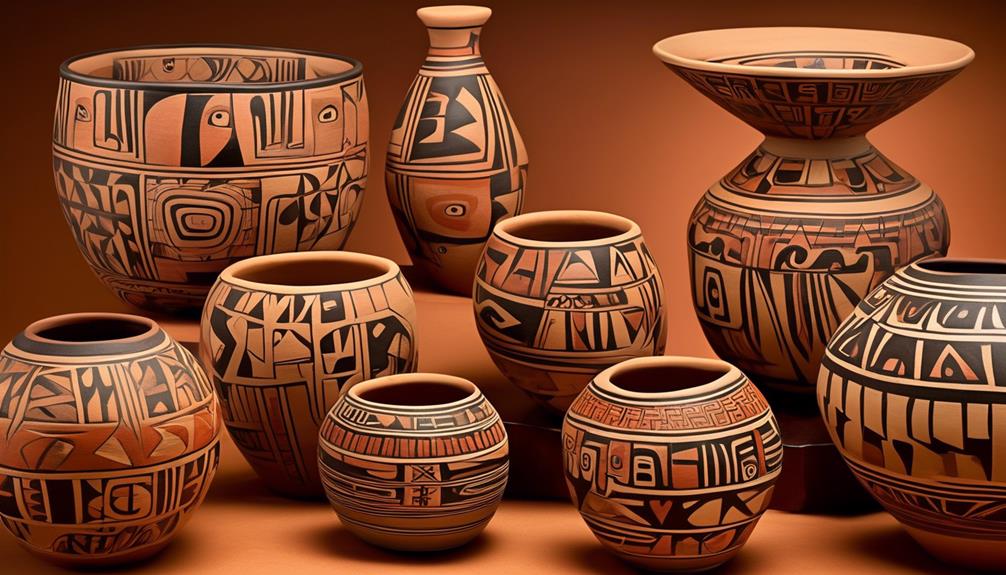When studying how the Hopi Tribe grew food, it is like observing a beautiful dance, intricately woven into the fabric of their culture and traditions. The methods employed by the Hopi people to prosper highlight their deep connection with the land and their ancestors.
By delving into the agricultural techniques, cultivated crops, and sustainable farming practices, we gain insight into not only how they nourished their bodies but also how their spiritual beliefs and practices were interwoven with their sustenance.
This holistic approach offers a unique perspective on the harmonious relationship between the Hopi people and the earth, leaving us eager to uncover the depth of their modern agricultural heritage.
Key Takeaways
- The Hopi tribe primarily produced food through sustainable agricultural techniques such as dry farming, crop rotation, and traditional irrigation methods.
- They had a deep spiritual connection to the land and practiced rituals and ceremonies to honor and maintain harmony with nature.
- The tribe emphasized the importance of maintaining biodiversity and preserving the earth for future generations.
- While integrating modern techniques, the Hopi tribe has adapted to contemporary challenges while preserving their agricultural heritage, ensuring food security, and minimizing environmental impact.
Agricultural Techniques
The Hopi Tribe employs traditional agricultural techniques to cultivate their crops, utilizing sustainable methods that have been passed down through generations. These traditional methods are deeply intertwined with the tribe's cultural and spiritual beliefs, forming an integral part of their farming rituals. The Hopi people have long practiced dry farming, a method that relies on capturing and retaining moisture in arid environments. By carefully selecting planting sites and using hand tools, such as digging sticks, they can efficiently cultivate their crops without relying on irrigation.
Farming rituals are central to the agricultural practices of the Hopi Tribe, guiding them in planting, tending, and harvesting their crops. These rituals are rooted in the tribe's deeply held respect for the land and the natural world. The planting of crops is often accompanied by ceremonies and prayers, seeking blessings for a bountiful harvest. Throughout the growing season, the tribe follows traditional practices for tending to their crops, ensuring that they're nurtured in harmony with the natural environment.
The traditional agricultural techniques and farming rituals of the Hopi Tribe reflect a deep understanding of their unique ecosystem and a profound respect for the land. These sustainable methods have sustained the tribe for generations, preserving both their cultural heritage and the productivity of their agricultural lands.
Cultivated Crops

When cultivating our crops, we carefully select planting sites and employ sustainable, traditional agricultural techniques passed down through generations. Traditional farming methods such as terracing, hand-irrigation, and the use of natural fertilizers are integral to our approach. These techniques not only preserve the land but also ensure that our crop diversity remains robust.
Our ancestors have taught us to cultivate a wide variety of crops, including corn, beans, squash, and melons. Each of these crops plays a crucial role in our diet and cultural traditions. The diverse range of cultivated crops also serves as a form of insurance against crop failures, as each crop has different climate and soil requirements.
Moreover, our traditional farming practices emphasize the importance of maintaining biodiversity, thus contributing to the overall health of the ecosystem. Through careful observation and a deep understanding of our environment, we continue to sustainably cultivate a rich tapestry of crops that have sustained our people for centuries.
Spiritual Beliefs and Practices
With a profound reverence for our ancestral traditions, our spiritual beliefs and practices are deeply interwoven with the rhythms of nature and the cycles of the land. The Hopi people hold a deep connection to the earth and the spirit world, which is reflected in our ritual ceremonies and daily practices. Our ancestral traditions guide us in honoring the land and all living beings, recognizing the interconnectedness of all things.
Ritual ceremonies play a central role in our spiritual life, marking important milestones such as planting and harvest seasons. These ceremonies are performed with great care and precision, following ancient protocols and prayers that have been passed down through generations. Through these rituals, we seek to maintain balance and harmony with the natural world, acknowledging the essential role of the land in providing sustenance for our people.
Our spiritual beliefs also encompass a profound respect for the land, viewing it as a living entity that sustains and nurtures us. We strive to live in harmony with nature, guided by the wisdom of our ancestors and the teachings of our spiritual leaders.
In essence, our spiritual beliefs and practices are intrinsic to our identity as the Hopi people, shaping our relationship with the land and the world around us.
Sustainable Farming Practices

Implementing sustainable farming practices has been a vital aspect of our agricultural endeavors, aligning with our deep reverence for the land and our commitment to preserving its fertility for future generations. As stewards of the earth, we've recognized the need to uphold traditional methods while minimizing our environmental impact. Here are some key sustainable farming practices we've adopted:
- Crop Rotation and Diversity:
- We adhere to the practice of rotating crops to maintain soil fertility and prevent soil erosion, a method passed down through generations.
- Additionally, we cultivate a diverse range of crops, promoting biodiversity and reducing the risk of crop failure.
- Water Conservation:
- Our farming practices prioritize efficient water usage, utilizing traditional irrigation methods that conserve water while ensuring our crops thrive.
- Soil Preservation:
- We employ techniques such as mulching and intercropping to protect the soil structure and enhance its nutrient content, mitigating the environmental impact of our agricultural activities.
Modern Agricultural Heritage
Our enduring commitment to preserving and evolving our agricultural heritage is evident in the integration of modern techniques that honor our ancestral wisdom and values. While we continue to uphold traditional methods of farming, we recognize the need to adapt to contemporary challenges.
The modern agricultural heritage of the Hopi Tribe is a delicate balance between preserving age-old practices and embracing innovations that address current issues.
In facing contemporary challenges, such as climate change and water scarcity, we've incorporated modern irrigation systems and sustainable farming technologies without compromising the essence of our traditional agricultural practices. This integration allows us to maintain the integrity of our heritage while ensuring the resilience of our agricultural endeavors.
Furthermore, the modern agricultural heritage of the Hopi Tribe emphasizes the responsible use of resources and the preservation of biodiversity. By leveraging scientific advancements, we aim to enhance crop yields and mitigate potential risks to our food production, all while respecting the interconnectedness of our ecosystem.
Our approach to modern agricultural heritage is a testament to the adaptability and wisdom of our ancestors, as we navigate the complexities of the contemporary world while staying true to our roots.
Frequently Asked Questions
How Did the Hopi Tribe Traditionally Store and Preserve Their Harvested Crops?
We traditionally store and preserve our harvested crops using various methods, including drying, grinding, and storing in underground pits called kivas.
Women play a crucial role in these processes, passing down agricultural rituals and knowledge through generations.
Our sustainable practices reflect our deep environmental adaptation and respect for the land.
While we honor our traditional methods, we also incorporate modern innovations to ensure crop sustainability for future generations.
What Role Did Women Play in the Agricultural Practices of the Hopi Tribe?
Women played a crucial role in the agricultural practices of the Hopi tribe. Their cultural significance was evident in the gender dynamics of food production.
Women were responsible for tending to the fields, using traditional methods that have been passed down through generations. Their knowledge and expertise in cultivating crops were essential to the tribe's sustenance.
This deep connection to the land and its resources reflects the integral role of women in sustaining the Hopi community.
Did the Hopi Tribe Have Any Specific Rituals or Ceremonies Related to Planting and Harvesting Crops?
We have observed that the Hopi tribe had specific rituals and ceremonies related to planting and harvesting crops. These rituals were deeply intertwined with their cultural and spiritual beliefs.
The planting ceremonies and harvesting traditions were significant events that honored the essential connection between the people and the land. Women played a crucial role in these ceremonies, demonstrating their vital contribution to agricultural practices.
Additionally, these rituals showcased the tribe's environmental adaptation and the preservation of traditional methods amidst modern innovations.
How Did the Hopi Tribe Adapt to Changes in the Environment and Climate to Ensure Their Food Production Was Sustainable?
Adapting to changes in the environment and climate was crucial for the Hopi tribe's sustainable food production.
Their ingenious adaptation techniques and deep understanding of the land allowed them to cultivate crops that were resilient to varying conditions.
By carefully selecting and nurturing their crops, the Hopi tribe ensured a sustainable food supply, even in the face of environmental challenges.
Their holistic approach to agriculture and climate sustainability continues to inspire many to this day.
What Modern Technologies or Innovations Have the Hopi Tribe Incorporated Into Their Agricultural Practices While Still Preserving Their Traditional Methods?
Incorporating innovative technologies while preserving traditional methods is crucial for the Hopi Tribe's agricultural practices. Our community has integrated solar-powered irrigation systems and sustainable farming techniques to enhance food production.
However, we also prioritize preserving our ancestral farming rituals and knowledge. This balance allows us to honor our heritage while adapting to modern challenges, ensuring the sustainability of our food production for future generations.
Conclusion
In conclusion, the Hopi tribe's agricultural techniques, cultivated crops, and spiritual beliefs allowed them to sustainably produce food for their community.
Their connection to the land and their respectful farming practices created a harmonious relationship with nature.
Like the roots of a sturdy mesquite tree, their farming heritage runs deep, grounding them in tradition and sustainability.
The Hopi people's modern agricultural practices are a testament to their enduring legacy of responsible land stewardship.
Mary is a passionate writer who brings creativity and a fresh perspective to our team. Her words have the power to captivate and inspire, making her an essential contributor to our content. Mary’s commitment to storytelling and dedication to promoting Indigenous culture ensures that her work touches the hearts of our readers. We’re fortunate to have her as part of our team.










